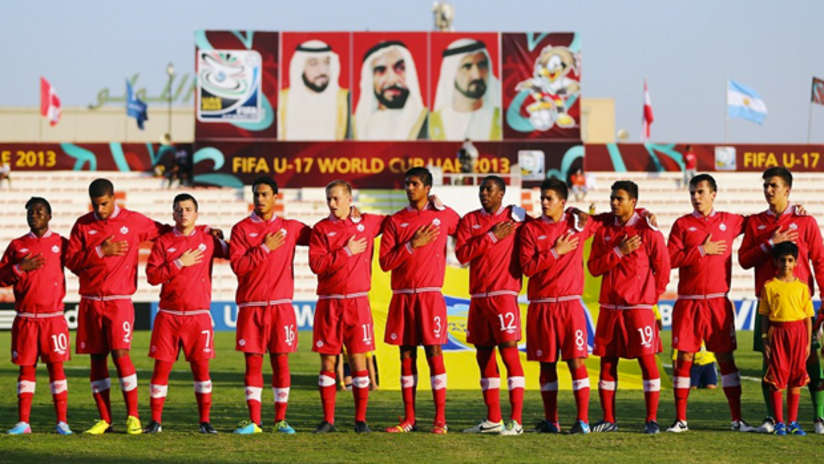VANCOUVER, BC – For many soccer players around the world – both professional and amateur – playing in a World Cup is nothing more than a pipe dream.
For five Vancouver Whitecaps FC Residency players, that dream became a reality earlier this month when Canada descended upon the FIFA U-17 World Cup in Dubai.
Canadian captain Marco Carducci and midfielders Marco Bustos, Matthew Chow, Kianz Froese, and Jordan Haynes each appeared for the Canadian U-17 squad that finished third in Group E. The Canadians drew their first two matches with Austria and Iran respectively before a 3-0 defeat to powerhouse Argentina officially eliminated them from the tournament.
“Obviously, we would have liked to been able to make some history and make it through to the knockout round,” Carducci told whitecapsfc.com. “But at the end of the day, I think we can be proud of what we put into it. We gave it our all and we got where we got … it was an amazing experience. There are no words to describe how proud it makes you feel to play in a World Cup for your country.”
Carducci, Canada’s starting goalkeeper and captain, was a bright spot for Sean Fleming’s squad throughout the competition. His best performance came in a 1-1 draw with Iran on October 22. The Middle Eastern side launched 23 shots towards the goal and 12 on target, but Carducci salvaged a point for the Canadians with a number of outstanding saves, including two in the dying stages of the match.
“It’s your job as a goalkeeper to be able to make some saves to keep your team in a game and I was happy I was able to do that,” Carducci said. “It’s all about the team. We’re there trying to do it collectively, but at the end of the day individuals have to pull their weight to do that for the team.”
The biggest takeaway from the experience was just that, according to Bustos. The Winnipeg, Manitoba native said he felt the team prepared for each match as best they could – it was the individual performances that let Canada down in the end.
“Getting knocked out of a tournament that meant so much made me realize that every single player from one to 21 in the squad to has to be at their best, especially in a tournament like this,” he told whitecapsfc.com. “That’s how the best teams win.”
Bustos said his best memory from the tournament was walking out of the tunnel in Canada’s first match against Austria and seeing his family in the stands during the national anthem – a sentiment echoed by Froese.
The U-17 World Cup was Froese’s official debut with Canada. The 17-year-old midfielder/striker, who still leads Whitecaps FC’s U-18 team with four goals in five matches, was born in Cuba and previously played with the country’s U-17 side; however, he was cleared by FIFA to play for Canada prior to the tournament.
“I was jumping up and down in school when I heard that I was going to be able to play in the World Cup with Canada,” said Froese, who started and played the full 90 minutes in each of Canada’s three matches.
“It was an unforgettable experience in terms of being able to play for our country and I think we played well,” he continued. “It was unfortunate that we got kicked out, but it was great. I’ll never forget it, that’s for sure.”
Although they weren’t able to move on, Carducci said there are still a number of positives to take from Canada’s showing. Prior to the 2011 U-17 World Cup, Canada had never even earned a point at the competition – now they're starting to turn some heads.
“I think in terms of Canada Soccer … we proved again that we’re competitive,” Carducci said. “We could have easily gotten a result in the first couple games. I’m not saying we definitely should have won those games, but we had the opportunity to win them. That shows that we’re building and that’s a credit to everything that’s going on.”
All five Whitecaps FC Residency players are back in Vancouver and eager to get back onto the pitch with the U-18s, who posted a 2W-2L-0D record in their absence. Their next match is November 9 against rival Portland Timbers at Percy Perry Stadium in Coquitlam, which leaves some much-needed time to reacclimatize after experiencing the high of playing in a World Cup.
“It feels surreal when you’re there … but I’m happy to be back,” Carducci said. “One of the key things our coach mentioned to us, this was obviously a great moment for all of us but it’s just another stepping stone, another building block. Your club is the most important place to be.”




